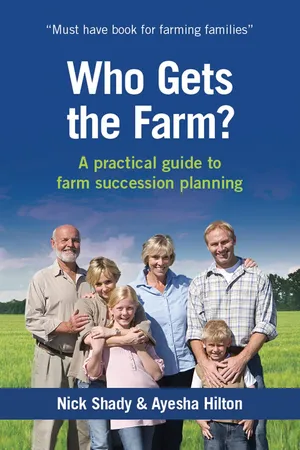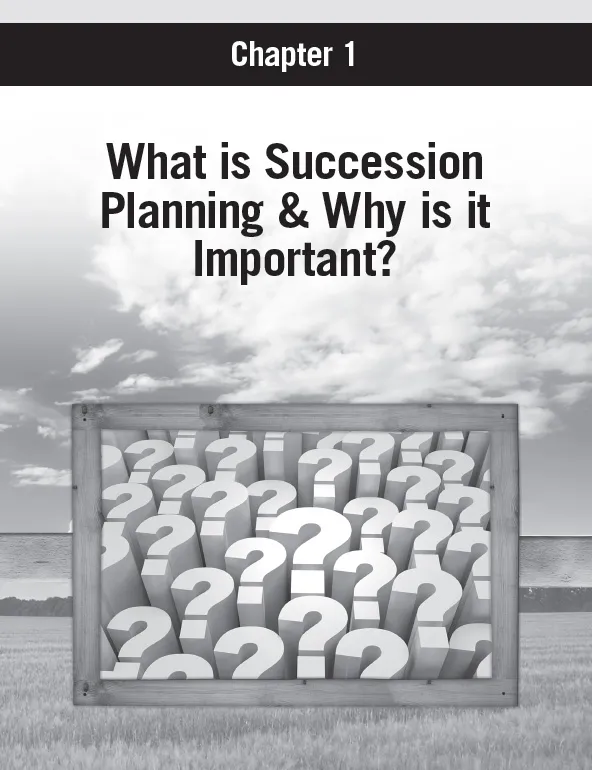![]()
![]()
Chapter 1:
What is Succession Planning & Why is it Important?
‘‘Poor succession planning is one of the biggest challenges facing farmers across the world and it can destroy businesses and families if it’s not done right.’’
Nick Shady
What a scary topic for most families in farming – succession planning – the transitioning of control of assets and management and all the potential conflict that might come with it. Yet, in other industries, succession planning is simply a part of normal business management and that’s how it needs to be in family farming.
So what exactly is succession planning?
Succession planning is a process that occurs over time where the knowledge, skills, labour, management, control and ownership of the farm business occurs between stakeholders (usually the retiring generation and the successor generation).
It involves the growth and preservation of the business and ultimately the transfer of assets and control to the next generation.
Each family farming business is unique in terms of how they run their farming operation, the family structure, the relationship dynamics and each family member’s dreams and expectations.
While succession planning may seem fraught with danger, it is far more hazardous in the long run to do nothing at all. You probably worked out long ago, if you’re still farming, that sticking your head in the sand doesn’t solve anything.
If you’re like many farming families, the thought of starting the succession planning process is challenging due to the risk of conflict or disagreement but the sooner you start planning, the better it will be for everyone involved.
With a comprehensive succession plan in place, you and your family will know what to expect when circumstances change. And things do change. We get married, we have children, we experience loss and injury and the business cycles through good years and bad years, great markets and poor markets.
There are so many variables in farming – you almost have to be a bit of a gambler to handle the stress! However, you can be prepared for many of the possibilities with a sound succession plan.
THE REASONS WHY FARMING FAMILIES AVOID SUCCESSION PLANNING
‘‘If succession planning issues were well understood by farmers, there would be more plans in place...’’1
Succession planning is an almost taboo subject for many farming families; it brings up a lot of fear and angst and often bitter resentment. It’s understandable why only about 50% of farming businesses have a succession plan in place.
If you’ve been avoiding succession planning, no doubt the following will sound familiar to you.
Here are the top five reasons farmers avoid succession planning:
1. Fear of Conflict
Fear of conflict and arguments is probably the biggest reason why people avoid succession planning. Farming is a unique type of business in that you are working with your family members, so avoiding conflict with the people you live and work with is important. There are ways of navigating the succession planning process to minimise conflict and increase family harmony.
2. Too Hard
Many families feel that the whole thing is just too hard. Succession planning is a big process. It takes a lot of effort and resources and there’s no quick fix. You have to develop your plan, implement it and then review and modify it as needed. You will see later in the book that there is a lot of work involved in succession planning but all the elements of the plan help you build a stronger business while looking after the needs and aspirations of family members.
3. Don’t Know How
Governments around the western world have put a lot of money into programs to help farmers develop and implement succession plans. But for all this effort, the number of farmers with succession plans has not shown much of an increase. Yes, succession planning can be complex but there are plenty of resources available to you.
4. Bad Past Experiences
If the head of the family farm has had a bad experience with succession planning with their own parents or family, it has probably left a bitter taste in their mouth and given them a bloody good reason to stay clear of succession planning. If managed well, a succession plan can avoid this type of bitterness.
5. Not Their Job
Who has responsibility for the succession plan? That’s a good question. Some may say it’s the job of the head of the farm. But what if they are unwilling to bring it up, then what? A succession plan is the responsibility of all members of the farming family. It might take one person in the family to have the courage to say, “Hey, we really need a succession plan.” Someone has to say it, why not you?
As you can see, all these reasons have truth to them but they shouldn’t put you off succession planning. As you will see below, succession planning is now more important than ever.
WHY SUCCESSION PLANNING IS MORE IMPORTANT THAN EVER
‘‘One of the most pressing issues is the ageing population of farmers. In 2011, the median age of farmers was 53 years, compared with 40 years for people in other occupations.’’2
Family farming has changed much over the last hundred years. Today, succession planning is more important than ever for a number of reasons.
Here are the top five reasons why succession is so important for today’s farming families:
1. Living & Working Longer
Farmers are now farming longer than ever as many are healthier and living longer. This means that the next generation are having to wait longer to take over the day to day management and running of the farm. On average, women live longer than men and this means that often, the mother will outlive the father and then either she controls the farming assets or the children have to provide for her security.
2. Farm Income Can’t Support Multiple Families
Many farming parents have more than one child working and living on the farm, yet many farms do not make enough income to support multiple families. Without capital expansion, and probably taking on more debt, there is simply not enough to go around for the next generation.
3. Carving-Up the Farm Reduces Economic Viability
Dividing up a farm into equal portions for the next generation may seem fair but it also reduces the on-going economic viability of the farming enterprise. Everyone may get their fair share of acres but then no one ...

